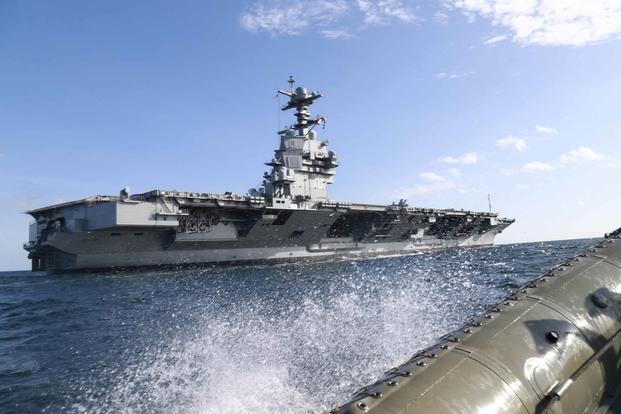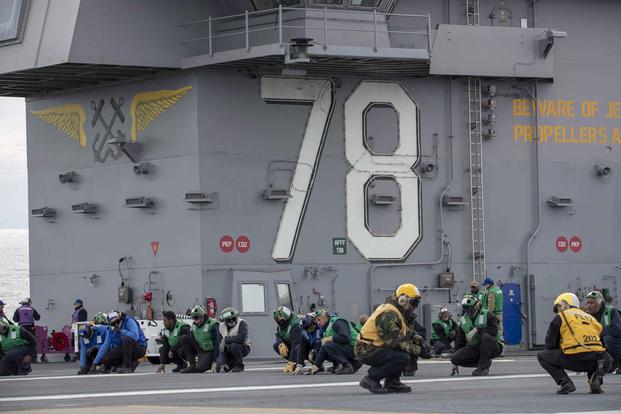The new acting secretary of the Navy said Thursday that President Donald Trump's concerns over persistent problems with the first Ford-class aircraft carrier have prompted him to make fixing those problems one of his top priorities.
"I was on the [carrier Gerald R. Ford] last week; the Ford is something the president is very concerned about," Thomas B. Modly told an audience at the annual U.S. Naval Institute Defense Forum Washington. "He talks to us about it a lot, and I think his concerns are justified because the ship is very, very expensive and it needs to work."
The advanced $13 billion carrier has been plagued by problems including glitches with its 11 new weapons elevators, which bring ammunition to the flight deck. The failure to solve many of the issues with the 23 new technologies introduced on the carrier have led to countless delays and still threaten its maiden deployment, which is planned for 2021.
There is a "trail of tears as to why we are where we are, but we need to fix that ship and make sure that it works," Modly said.
Related: To Build its Newest Aircraft Carrier, Newport News Shipyard Used Lessons Learned from Ford
"There is nothing worse than a ship like this being out there ... as a metaphor and a whipping boy for why the Navy can't do anything right, and so we are going to get it right and that is going to be one of my top priorities here," he added.
Despite successes in acquisition reform, the Navy is still struggling to move beyond the antiquated, slow-moving acquisition system established around the concept that large programs such as the Ford take decades to complete, Modly said.
"Part of the problem with the Ford is, how do you determine who is accountable for decisions that were made 10 to 12 years ago? ... No one who was there who made those decisions is still around, because it's such a long program," he said.
C. Michael Petters, president and CEO of Huntington Ingalls Industries, the shipbuilder responsible for delivering the new carrier, also spoke about the Ford at the forum.
The firm has solved issues with 19 of the advanced technologies introduced on the ship, he said.
The remaining problems have to do with "software, maybe wireless communications -- things like that," Petters said, adding that four of the 11 elevators were certified by the time the Ford left the shipyard.
"We actually had a path that said, 'Let's go; we are going to knock this out of the park,' but then as we saw the last of those technology issues, we came to understand that the things that we understood about tolerances in fabrication needed to be adjusted," he said. "And what that did, when you go back and insert that into the schedule, that drives the schedule out. That is the romance of lead ships, that there is a try and fail, try and fail, try until you get it right."
Petters said the firm has had more than 100 technicians on the Ford since it went to sea "working around the crew, working with the crew getting the rest of the elevators done."
Huntington Ingalls officials explained in July that the new elevators, radar and other technologies were initially planned to be spread out over the first three Ford-class carriers.
Modly said he understands the realities of introducing complicated new technologies onto a new class of ship, and he is confident that the Ford-class carriers will bring a new level of superiority to the fleet.
"Everything that the Ford should be able to do is going to be a game changer for us," he said. "We just have to make sure that it can do it, because we've got several more coming behind it."
-- Matthew Cox can be reached at matthew.cox@military.com.
-- Military.com's Gina Harkins contributed to this report.
Read more: 3 Dead, 7 Injured After Shooting at Naval Air Station Pensacola; Shooter Killed















